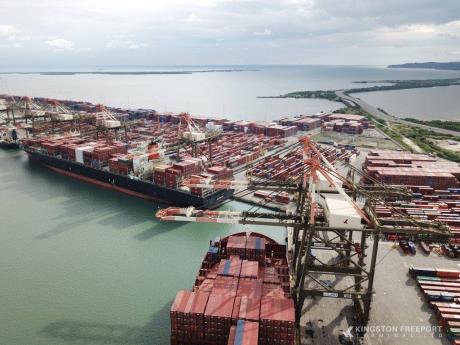SAJ proud to share the success of the port of Kingston
The Shipping Association of Jamaica (SAJ) has expressed its pride in sharing the recently announced success of Kingston Freeport Terminal Limited (KFTL) in its attainment of 36 container moves per hour on theCosco Beijing, a Post-Panamax container ship, during the period January 24-25, 2019.
This is the first time that the terminal has achieved that level of productivity under its new French-owned operator. KFTL reported that it achieved an average crane productivity of 36 moves per hour and average berth performance of 136 moves per hour with four gantry cranes working on theCosco Beijing on January 24.
According to Trevor Riley, chief executive officer of the SAJ, “The association is pleased to note this remarkable achievement and to recognise that the team that recorded this milestone included 85 members of the SAJ’s stevedoring workforce, working alongside colleagues at KFTL.”
Riley added that, “The SAJ has been an integral part of the success of the port of Kingston since our inception 80 years ago. The performance recorded on this vessel is an achievement to be celebrated. However, we do not rest on past performance and commit our workforce to continue to work with KFTL to make productivity a habit as it has been at the port for the last 50 years.”
TRAINING PROGRAMMES
In addition to its own internal recruitment, selection and training programmes for stevedores, the SAJ was a pioneer in the establishment of stevedoring Certification to National Council on Technical and Vocational Education and Training level in Jamaica, working with the HEART Trust to provide a robust, advanced training programme for workers engaged in the loading and unloading of vessels.
According to Kingston Freeport Terminal Limited, which was granted a 30-year concession in 2016 to operate the Kingston Container Terminal, a total of 3,304 moves were handled within 24 hours of operation on the Post-Panamax vesselCosco Beijing, which arrived at the terminal on January 24. That included 1,464 containers being unloaded and another 1,840 loaded on to the vessel.
The SAJ has provided a stable and coherent labour force for break bulk and containerised cargo shipping at the port of Kingston, now represented by KFTL and Kingston Wharves Limited, since 1939. With more than 90 per cent of the port’s activities focused on trans-shipment activities, the SAJ operates a dynamic labour force management system that allows for flexible and just-in-time deployment of highly skilled port workers for all areas of cargo loading, unloading and stowage.
Keeping pace with the demands of international trade, increasing transport volume and the widespread use of containers, the SAJ, through innovation, has created lasting improvement in the conditions of work for port workers. Reforms implemented by the SAJ has had a modernising effect on the entire industry in Jamaica and other parts of the Caribbean.
Reforms initiated by the SAJ continue to create major changes in the organisation, structure and the management of port workers. Although previously the labour force was low skilled and occasional, through ongoing modernisation and training, employment of port workers has become regularised and highly skilled to meet the changing needs of containerised cargo shipping and greater use of technology in the industry.
“The SAJ is therefore much more than a supplier of port labour,” says Riley. “In fact, the association has an institutionalised role and presence in the Jamaican maritime industry and has paved the way for the infusion of modern techniques in container cargo handling, the use of technology and globally recognised training.”
The SAJ plays a benchmarking role in collective bargaining agreements in the Jamaican maritime industry, such that the outcomes of SAJ negotiations are cascaded throughout the system and implemented by other ports.
“As a leader in the industry, SAJ substantially affects the tone of industrial relations and, consequently, has been pivotal in creating a stable workforce. Importantly, the SAJ has been able to balance the interests of all stakeholders – ship owners, terminals, employers and stevedore workers – gaining the respect of most players, including the trade unions, and becoming a trusted part of the industry,” Riley added.

